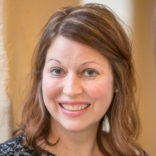I just experienced one of the most powerful 2 days of my life as one of the 1,400 disability rights advocates and activists who came to Boston for the second Ruderman Family Foundation Inclusion Summit.
The Ruderman Family Foundation has long been the leading force in funding efforts to make the Jewish community more inclusive of people with disabilities and currently supports initiatives across different denominations working on doing so in congregations, schools and community organizations.
But the focus of this Summit was on not only faith, education and Jewish communal issues—but was about bringing together leaders in a wide array of sectors—including technology, policy, human services, fashion, performing arts, education, social justice, business, housing, advocacy, sports, and more — to network, share best practices, and move the conversation forward on key issues pertaining to disability inclusion.
The clear message from Jay and Shira Ruderman was a call for the disability community, which can be fractioned into different silos of specific disabilities, to unite and become the most powerful social and political force in the world.
Through the Summit, the reminder that 20% of the population has some kind of disability was brought forward—and that the disability rights movement is in fact a human rights/civil rights movement.
Political Action
The Summit did not shy away from the urgent political matters that are on the minds of people with disabilities and advocates and allies in the movement: the potential impact of cuts in Medicaid and the current tax bill.
The opening plenary featured a dialogue between Cong. Jim Langevin (D-Rhode Island) and Cong. Gregg Harper (R-Mississippi), Co-Chairs of the Bipartisan Disabilities Caucus in which Congressman Langevin emphasized that “Medicaid is a vital lifeline for people with disabilities.”
On Monday morning, the amazing, articulate advocate Sen. Maggie Hassan (D-New Hampshire) was interviewed by journalist Norm Ornstein about the devastating negative impact on families and individuals with disabilities of the proposed Tax Bill and Medicaid changes.
“If people matter, then we need to make sure that the law recognizes that,” Senator Hassen said.
Through the Summit, a number of breakout sessions focused on social issues including law enforcement, advocating for social justice, healthcare and voting accessibility.
Entertainment
While the Summit was focused on really serious issues, it also brought together an incredible array of talented performers with disabilities.
Sunday evening’s plenary featured a powerful video about Oscar-winning actress Marlee Matlin, followed by a live talk from Marlee in which called out Hollywood for not casting actors with disabilities.
Actor Danny Woodburn was a delightful MC through the Summit and TV star Nyle DiMarco, the deaf winner of Cycle 22 of the “America’s Next Top Model” competition was featured in a session advocacy. The Summit inclusion summit concluded with deaf singing sensation Mandy Harvey, who inspired viewers around the world this year by finishing in fourth place during Season 12 of the “America’s Got Talent.”
Takeaways for the Jewish Community
Present at the Summit were grassroots leaders, executive directors of major agencies, Federation and other Jewish communal professionals. I was fortunate to connect with others working in synagogue inclusion during an Affinity session hosted by CJP and to present about our work with Jewish Learning Venture’s Whole Community Inclusion during an educators Affinity session hosted by Gateways, a Boston-based agency that enables Jewish children with special educational needs to become successful participants in the Jewish community.
“I don’t think i have ever seen so many people passionate about disabilities assembled in one place. Seeing people with disabilities, dogs, motorized scooters, interpreters, quiet rooms and more seemed so natural,” said Howard Blas, Director of the National Ramah Tikvah Network. “While each session was so informative ( I particularly enjoyed two sessions addressing employment), it was the chance to meet and share with colleagues–both formally and informally–which made the Summit so special.”
Shelly Thomas Christensen of Inclusion Innovations agreed: “Listening to so many colleagues from across the spectrum of Jewish organizations enthusiastically share how deeply their leadership has supported people with disabilities to belong is my takeaway,” she said.
The Summit also included hundreds of college students from Hillel across the county–with special sessions for young leaders. “At the Summit, I realized how powerful and impactful the disability community would be if we all came together and fought for change, not just as individual communities, but as a collective force,” said Adam Fishbein, a National Young Leadership Fellow currently serving in the Public Policy cohort at RespectAbility and a self-advocate with Tourette Syndrome who came to represent American University Hillel.
The New York Jewish Week brings you the stories behind the headlines, keeping you connected to Jewish life in New York. Help sustain the reporting you trust by donating today.





